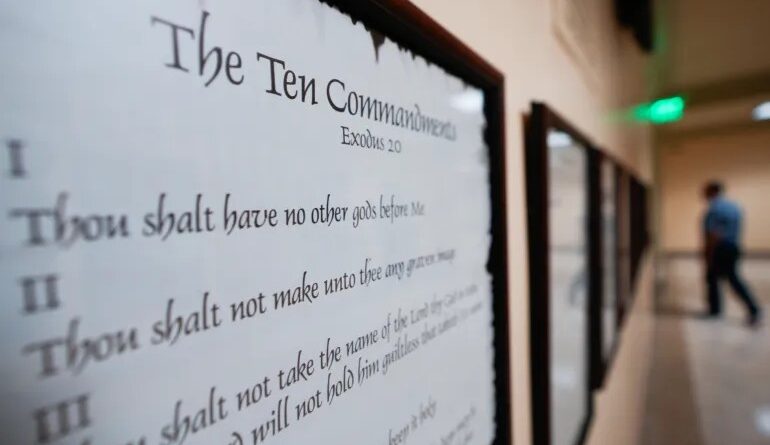Ten Commandments In Schools: Is It Necessary Or Excessive?
A proposed bill in Texas is reigniting debate over the role of religion in public education. State Senator Phil King has introduced Senate Bill 10, which seeks to mandate the display of the Ten Commandments in public school classrooms and allocate time for Bible reading. While proponents argue that this move could reinforce moral values, others, including a prominent Dallas pastor, believe it may not align with Jesus’ teachings.
The bill follows similar legislation in Louisiana and Oklahoma, signalling a broader push to incorporate religious principles into the public school system. Supporters claim that the Ten Commandments provide a foundational moral compass for American laws and ethics, arguing that their presence in schools could help counteract societal decline and promote traditional values.
However, Jeff Warren, senior pastor of Park Cities Baptist Church in Dallas, has questioned whether such mandates truly reflect Christian principles. In a sermon last November, Warren challenged believers to consider the motivations behind advocating for religious displays in secular spaces.
Referencing Matthew 7, where Jesus warns against casting pearls before swine, Warren suggested that enforcing religious beliefs through government mandates might not be the most effective approach.
“We see some demanding that the Ten Commandments be displayed in public spaces,” Warren said. “I fully support the Ten Commandments, but would Jesus? He might say, ‘Pearls before swine.’ Instead of mandating them, how about actually living them out?”
Warren also pointed out that while many advocate for the Ten Commandments in schools, few push for the display of the Beatitudes—Jesus’ teachings from the Sermon on the Mount—which emphasise humility, mercy, and righteousness over legalistic commands.
“Nowhere in the Beatitudes or the Sermon on the Mount do we see Jesus promoting state mandates as the way to transform society,” Warren argued. “Instead, He calls His followers to embody these principles in their daily lives.”
Beyond theological concerns, legal scholars highlight constitutional issues with the proposed bill. The U.S. Supreme Court ruled in Stone v. Graham (1980) that requiring the Ten Commandments in public school classrooms violates the Establishment Clause of the First Amendment. The ruling emphasised that state endorsement of religious doctrines is unconstitutional, particularly when it promotes a specific faith tradition over others.
RELATED: Texas School Bans Bible Under New district Law
“The First Commandment states, ‘You shall have no other gods before me,’ which is a direct religious claim,” Warren noted. “Requiring its display in public schools raises clear constitutional issues regarding government endorsement of a particular faith.”
Legal experts caution that if Texas moves forward with Senate Bill 10, it could face significant legal challenges similar to those encountered in other states that attempted similar measures.
Warren believes that the push for government-backed religious displays is part of a broader issue within American Christianity—what he describes as Christian nationalism. This ideology, he argues, focuses on asserting religious dominance in public spaces rather than fostering genuine faith.
“The mandate to display the Commandments in public schools appears more about marking territory than about actual discipleship,” Warren said. “It reflects a political movement rather than a commitment to following Jesus’ teachings.”
While Warren opposes state-imposed religious displays, he does not dismiss the significant influence of Judeo-Christian values on American history. Instead, he suggests that schools should teach about the Ten Commandments within the context of history and ethics courses rather than mandating their public display.
“Students should learn how Judeo-Christian principles have shaped American morality and legal traditions,” Warren stated. “However, enforcing their display through legislation risks distorting their original intent.”
As Texas lawmakers consider Senate Bill 10, the debate over faith’s role in public spaces is likely to continue. The core question remains: Should religious principles be legislated in public institutions, or should they be lived out by individuals and faith communities?
With figures like Senator Phil King advocating for government-backed religious symbols and Pastor Jeff Warren emphasizing personal faith practice, the conversation highlights the ongoing tension between religion, law, and public education in America.
Content Credit| Oyedepo Oluwafifedoyinsola
Picture Credit | https://www.aljazeera.com/




